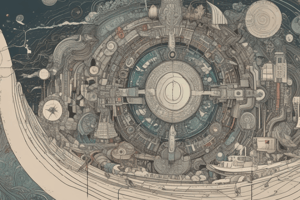Podcast
Questions and Answers
Cognition is defined as the process of acquiring knowledge through sensory experiences.
Cognition is defined as the process of acquiring knowledge through sensory experiences.
False (B)
Thinking continues to occur even during sleep, though our awareness of it may differ.
Thinking continues to occur even during sleep, though our awareness of it may differ.
True (A)
The cerebral cortex is primarily responsible for regulating physical reflexes rather than cognitive processes.
The cerebral cortex is primarily responsible for regulating physical reflexes rather than cognitive processes.
False (B)
The cognitive activities of humans are considered unique due to their dependence on complex reasoning and memory.
The cognitive activities of humans are considered unique due to their dependence on complex reasoning and memory.
Attention is one of the cognitive functions that facilitates the process of knowledge acquisition.
Attention is one of the cognitive functions that facilitates the process of knowledge acquisition.
Thinking includes tasks such as remembering and daydreaming, which are part of cognitive processes.
Thinking includes tasks such as remembering and daydreaming, which are part of cognitive processes.
Cognitive processes are universally similar across all living organisms, governed by identical concepts and rules.
Cognitive processes are universally similar across all living organisms, governed by identical concepts and rules.
The primary way humans acquire knowledge is through direct instruction from parents and teachers.
The primary way humans acquire knowledge is through direct instruction from parents and teachers.
Thinking is solely an instinctive reaction rather than a constructive process.
Thinking is solely an instinctive reaction rather than a constructive process.
Reasoning is primarily a random process without logical conclusions.
Reasoning is primarily a random process without logical conclusions.
Inductive reasoning is considered logically true and guarantees a realistic conclusion.
Inductive reasoning is considered logically true and guarantees a realistic conclusion.
Concepts are mental structures that allow us to organize knowledge systematically.
Concepts are mental structures that allow us to organize knowledge systematically.
The process of thinking begins only after a solution to a problem has been found.
The process of thinking begins only after a solution to a problem has been found.
In deductive reasoning, we move from specific instances to general conclusions.
In deductive reasoning, we move from specific instances to general conclusions.
A potato is classified as a vegetable when it is recognized through the process of abstraction.
A potato is classified as a vegetable when it is recognized through the process of abstraction.
Problem-solving is considered a separate activity from thinking.
Problem-solving is considered a separate activity from thinking.
All premises in deductive reasoning must be true for the conclusion to be logically valid.
All premises in deductive reasoning must be true for the conclusion to be logically valid.
Considering the road's condition and traffic density leverages critical thinking skills in route selection.
Considering the road's condition and traffic density leverages critical thinking skills in route selection.
A mental set refers to the ability to approach a new problem with a fresh perspective.
A mental set refers to the ability to approach a new problem with a fresh perspective.
Heuristics are considered exact methods that guarantee a correct result every time.
Heuristics are considered exact methods that guarantee a correct result every time.
Algorithms can be compared to a recipe with detailed instructions to achieve the same result.
Algorithms can be compared to a recipe with detailed instructions to achieve the same result.
Trial and error is often the most efficient problem-solving strategy available.
Trial and error is often the most efficient problem-solving strategy available.
One of the conditions that prompt the use of heuristics is having too little information.
One of the conditions that prompt the use of heuristics is having too little information.
A problem-solving strategy is defined as a plan of action used to arrive at a solution.
A problem-solving strategy is defined as a plan of action used to arrive at a solution.
Using a mental set can lead to improved problem-solving by encouraging flexibility in thought.
Using a mental set can lead to improved problem-solving by encouraging flexibility in thought.
A 'rule of thumb' is an example of an algorithm used in problem-solving.
A 'rule of thumb' is an example of an algorithm used in problem-solving.
Algorithms are not commonly used in computer science.
Algorithms are not commonly used in computer science.
Breaking a large goal into smaller steps is an example of using an algorithm.
Breaking a large goal into smaller steps is an example of using an algorithm.
Study Notes
Understanding Thinking
- Thinking is a cognitive function that involves manipulating ideas, images, and mental representations.
- It utilizes stored knowledge for tasks like remembering, imagining, problem-solving, and concept formation.
- Humans rationalize problems by logically establishing relationships among concepts and forming opinions based on environmental evaluations.
Cognition and Knowledge Acquisition
- The process of acquiring knowledge is termed cognition, influenced by cognitive functions such as attention and imagination.
- Cognitive processes are managed by the cerebral cortex, highlighting their specificity to human beings.
- Cognition utilizes concepts, facts, propositions, rules, and memories.
Nature of Thinking
- Thinking can occur even during sleep, with awareness differentiating it from non-thinking activities.
- It is a constructive process, transforming information into new representations and involving activities like inferring, abstracting, and creative thinking.
Problem-Solving Process
- Problem-solving initiates thinking, which follows steps like judging, abstracting, inferring, and reasoning.
- Decisions may depend on various factors like conditions of the environment, traffic situations, and safety considerations.
Concepts and Reasoning
- Concepts categorize objects and events, allowing systematic organization of knowledge. They can infer behaviors but cannot be directly observed.
- Reasoning, essential for logical thinking and problem-solving, involves drawing conclusions from facts and stored information. Two types of reasoning:
- Deductive Reasoning: From general premises to specific conclusions (e.g., "All fruits have seeds, therefore mangoes have seeds").
- Inductive Reasoning: From specifics to general conclusions, which may not always be empirically true (e.g., "Some good students love reading, thus good students may love reading").
Role of Problem-Solving
- Problem-solving is integral to daily life, varying in complexity and duration. It uses both internal (mental) and external (social) resources to find solutions.
- A mental set refers to the tendency to approach new problems with strategies that worked in the past, which may hinder innovative thinking.
Problem-Solving Strategies
- Trial and Error: Involves testing multiple solutions until one works; often time-consuming.
- Algorithms: Step-by-step instructions that guarantee the same outcome, often found in computing and like a recipe.
- Heuristics: General problem-solving frameworks or mental shortcuts that expedite decision-making, though not always rational or accurate.
Conditions for Employing Heuristics
- Heuristics are utilized under specific conditions:
- When faced with excessive information.
- When a decision must be made quickly.
- For decisions deemed unimportant.
- With limited information available.
- When a familiar heuristic comes to mind.
Application of Heuristics
- A common heuristic is breaking down large tasks into smaller steps, making daunting projects manageable (e.g., writing a long essay).
- A "working backwards" approach focuses on the end result, assisting in effectively solving a problem.
Studying That Suits You
Use AI to generate personalized quizzes and flashcards to suit your learning preferences.
Description
This quiz explores the concepts of thinking as a cognitive function, focusing on idea manipulation, problem-solving, and knowledge acquisition. Understand how our minds rationalize problems and form opinions based on our environment. Test your knowledge on cognition and its influence on how we learn.




